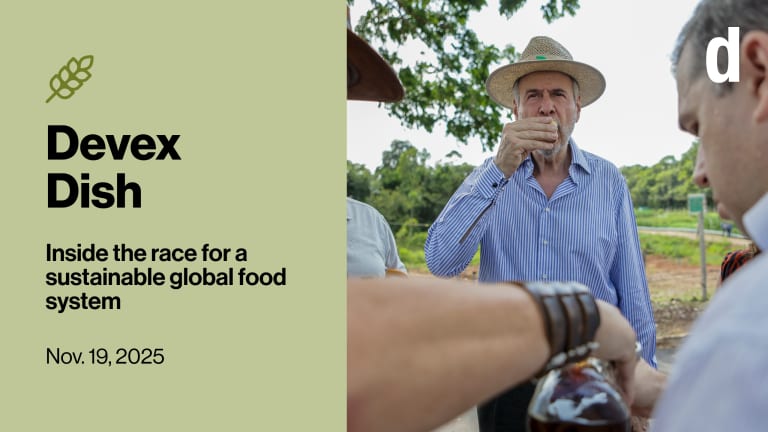Q&A: AfDB's digital strategy for agriculture
AfDB recently launched a program aimed at helping governments create enabling environments for agtech. Ed Mabaya, manager of the agribusiness development division, gives Devex the details.
ACCRA, Ghana — Many in the African agriculture sector are optimistic about the potential that new tech solutions, such as the use of mobile phone applications and drones, could have in boosting the output of smallholder farmers and linking them to markets. But while new tech solutions are emerging at a rapid pace, governments have been slow to adapt to the changing environment — which can prevent these solutions from scaling up beyond the pilot phase, according to panelists at the African Green Revolution Forum in Ghana this month. “If governments want these digital solutions to work, they need to make some initial investments to create what I call a “backbone” structure — the databases, the registration systems and regulatory frameworks.” --— Ed Mabaya, manager, agribusiness development division, AfDB Enter the African Development Bank, which in August launched a program aimed at helping governments create enabling environments for agtech. The Digital Solutions for African Agriculture program will provide loans to governments, allowing them to finance projects such as digitally registering farmers, creating technology parks, and launching digital marketplaces. The program sits under the bank’s Feed Africa strategy. Devex sat down with Ed Mabaya, manager of the agribusiness development division at AfDB, to discuss the initiative. This interview has been edited for length and clarity Can you tell me about the bank’s new program? We believe there is a lot governments can do to create the backbones on which digital solutions rely. This includes creating the right policy environment. Our point of entry when we are doing most of our investments, at least in my department, is to work with governments. They usually have identified priority interventions. For example, with market information services, governments already know that farmers need accurate information on the prices of commodities. For the past couple of decades, governments had whiteboards in different markets where they would write information on commodity prices. That is being replaced by digital platforms where farmers can get this information. We are a bank. We only lend to governments for what they want to do. We advise and we recommend agendas. Our role — as a bank that works in 54 African countries — is we can say that we’ve seen a project work in another country and suggest that a government consider it. If governments want these digital solutions to work, they need to make some initial investments to create what I call a “backbone” structure — the databases, the registration systems, and regulatory frameworks … The scale of what we are trying to finance is not at the level of the [tech] application. We work with governments to ensure the infrastructure is there that allows applications to work more efficiently. What are some more examples of these “backbone” projects? If the government wants to, for example, have an input subsidy program, they need to have these farmers on an e-registration system so that each farmer has a unique number and location of where they are. This, only the government can do because of the sensitivities related to privacy and the need to do this at a national level. It’s not useful enough if you just do it in one village. You need to include everybody, and it needs to be standardized. Agricultural extension workers are one of the biggest budget components for governments in the area of agriculture. There is a unique window to digitize materials in a way that is more efficient for farmers, to help them get more accurate and instantaneous information that is valuable to them. It also lowers the cost of the traditional model of an extension officer. If a government wants to develop a digital agriculture plan, there is a real process — bills have to be passed. We finance that process, maybe bringing on board expertise. What is the scale and scope of the program? We are working with target countries. We decided we want to start in countries that are already at a certain level of readiness. These are countries that already have good digital infrastructure and where smallholder farmer culture is important. We are in the early stages of engagement with about six or seven governments to judge their appetite to develop different solutions in this space. We are financing different studies. We want to know who the players are. We are doing all the benchmarks in different countries. Which countries? It’s too early now to share. We will probably be able to share within two or three months. What is the lifetime of the project? Typically, our projects run three to five years. “We are getting more and more phone calls from governments saying: “We are hearing about this digital agriculture thing, what can you do for our country? Can we start a conversation?” --— How does the private sector get involved in this project? Although we lend to governments, the government will not implement this work. For registering farmers, for example, government is probably not best positioned. Governments can borrow money, but ultimately this work is done and implemented by companies that have expertise and technologies to go out and do this. Once the basic infrastructure is in place, this is where we believe we have created the ecosystem where the private sector can go in and say it has these solutions for the dairy industry, for example, and it can then ride off this backbone that the government has created. For companies interested in getting involved, what is your advice? Knowing what the government plans to do is very critical. Right now, I think we have a situation where the industry has been making steady progress and policy regulation has somewhat lagged behind. But I think you are going to see soon more and more governments paying attention to what’s happening in this space. Understanding the intentions of governments is critical for investors, especially issues around data ownership and privacy. What are the potential challenges moving forward with this program? What is important is that while we realize the potential in digital solutions, we remind ourselves that what makes agriculture work has not changed. You still need water, fertilizer and good seed. These are the core, 90% of what it takes to grow anything. There is a temptation in the developing world to go for the new shiny toy, neglecting these core staples. Our role is to be mindful of that. How much funding is allocated for this program? It’s open-ended. This is part of our “Feed Africa” strategy, which lends about $1.5 billion dollars a year to different African countries. The basket of programs we have under Feed Africa is very varied. It’s value-chain development, it’s climate-smart agriculture, it’s post-harvest loss handling. I think this portfolio is going to grow more and more as governments are more aware of these possibilities … We are getting more and more phone calls from governments saying: “We are hearing about this digital agriculture thing, what can you do for our country? Can we start a conversation?” Editor’s note: The Alliance for a Green Revolution in Africa facilitated Devex's travel and logistics for this reporting. Devex maintains full editorial independence and control of the content.
ACCRA, Ghana — Many in the African agriculture sector are optimistic about the potential that new tech solutions, such as the use of mobile phone applications and drones, could have in boosting the output of smallholder farmers and linking them to markets. But while new tech solutions are emerging at a rapid pace, governments have been slow to adapt to the changing environment — which can prevent these solutions from scaling up beyond the pilot phase, according to panelists at the African Green Revolution Forum in Ghana this month.
Enter the African Development Bank, which in August launched a program aimed at helping governments create enabling environments for agtech. The Digital Solutions for African Agriculture program will provide loans to governments, allowing them to finance projects such as digitally registering farmers, creating technology parks, and launching digital marketplaces. The program sits under the bank’s Feed Africa strategy.
Devex sat down with Ed Mabaya, manager of the agribusiness development division at AfDB, to discuss the initiative.
This story is forDevex Promembers
Unlock this story now with a 15-day free trial of Devex Pro.
With a Devex Pro subscription you'll get access to deeper analysis and exclusive insights from our reporters and analysts.
Start my free trialRequest a group subscription Printing articles to share with others is a breach of our terms and conditions and copyright policy. Please use the sharing options on the left side of the article. Devex Pro members may share up to 10 articles per month using the Pro share tool ( ).
Sara Jerving is a Senior Reporter at Devex, where she covers global health. Her work has appeared in The New York Times, the Los Angeles Times, The Wall Street Journal, VICE News, and Bloomberg News among others. Sara holds a master's degree from Columbia University Graduate School of Journalism where she was a Lorana Sullivan fellow. She was a finalist for One World Media's Digital Media Award in 2021; a finalist for the Livingston Award for Young Journalists in 2018; and she was part of a VICE News Tonight on HBO team that received an Emmy nomination in 2018. She received the Philip Greer Memorial Award from Columbia University Graduate School of Journalism in 2014.








